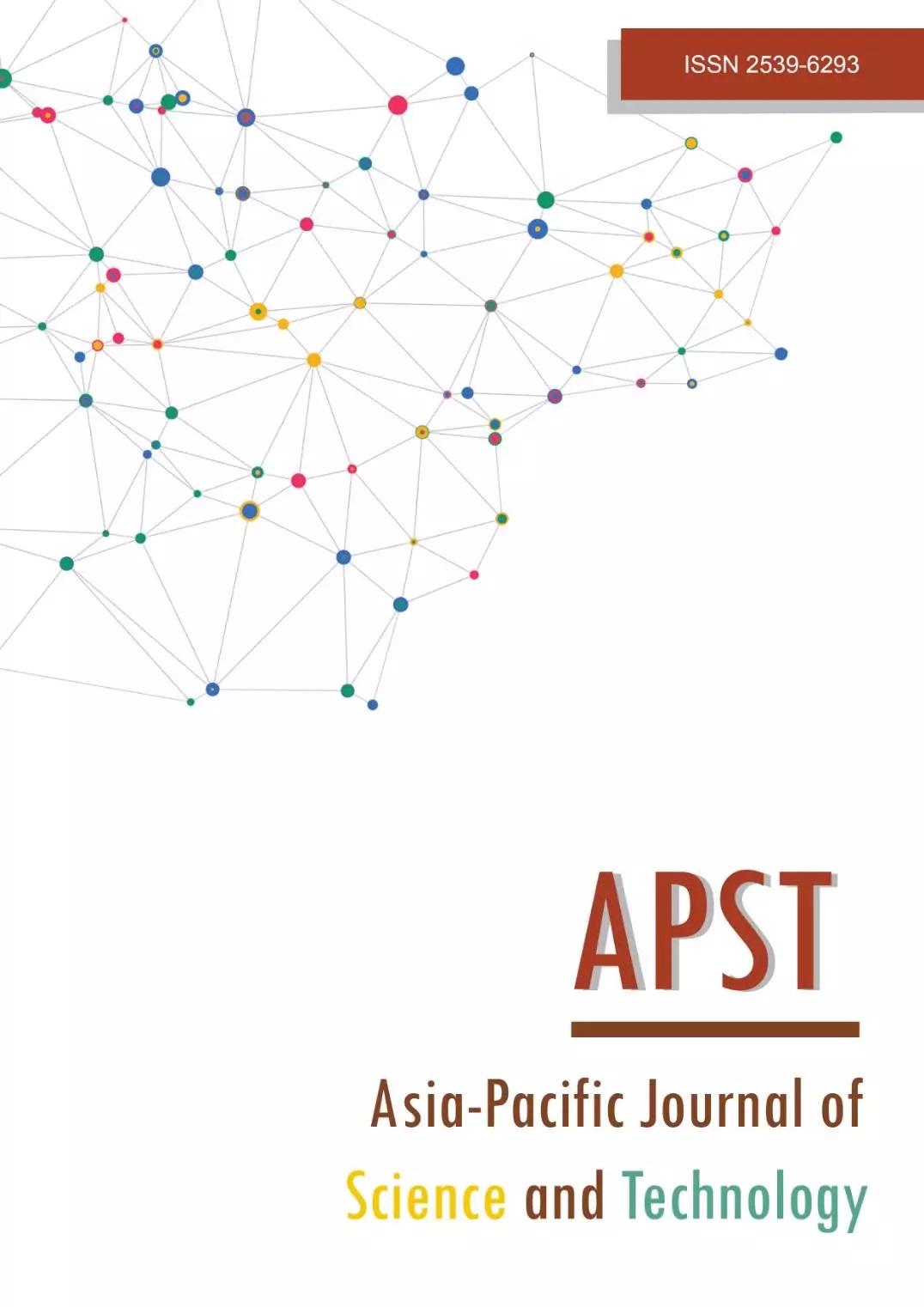Factors influencing appropriate management of household waste in developing country
Main Article Content
Abstract
Household waste generation is a critical problem in Thailand. Effective solutions for resolving the household waste problem need to include improving behaviors vis-à-vis reducing, reusing, and recycling. This study was aimed to determine the factors that influence appropriate household waste management in Thailand. Data were collected between January and November 2018 using a structured questionnaire. The proportion of appropriately household waste management was reported as a percentage with its 95% confidence interval (CI). A Generalized Linear Model (GLM) was used to identify the factors influenced with appropriate household waste management. The proportion of appropriate household waste was only 6.73% (95% CI: 5.04 to 8.78). The results indicate that household waste management was significantly influenced by the respondent’s status, the type of recycling waste buyback vehicle, and appropriate behavior in household waste disposal. Based on the findings, Thailand's government should support a new policy for increasing appropriate household waste management by promoting a recyclables buyback and collection vehicle for each community.
Article Details
References
Tchobanoglous G, Theisen H, Vigil S. Integrated solid waste management: Engineering principles and management issues. McGraw-Hill;1993.
Kamran A, Chaudhry MN, Batool SA. Effects of socio-economic status and seasonal variation on municipal solid waste composition: a baseline study for future planning and development. Environ Sci Eur. 2015;27(1):16.
Jafari A, Heydari J, Keramati A. Factors affecting incentive dependency of residents to participate in e-waste recycling: a case study on adoption of e-waste reverse supply chain in Iran. Environ Dev Sustain. 2017;19(1):325-338.
Singh A. Remote sensing and GIS applications for municipal waste management. J Environ Manage. 2019; 243:22-29.
Hoornweg D, Tata BP, Kennedy C. Environment: waste production must peak this century. Nature. 2013;502(7473):615. PMID:24180015.
Zheng J, Ma G, Wei J, Wei W, He Y, Jiao Y, et al. Evolutionary process of household waste separation behavior based on social networks. Resour Conserv Recycl. 2020;161:105009.
International Monetary Fund. World economic outlook database-WEO groups and aggregates information April [Internet]. 2009 [cited 2020 Dec 23]. Available from: https://www.inf.org.external/pub
s/ft/weo/2009/01/weodata/groups.htm#oem.
Pollution Control Department. Thailand State of Pollution Report 2019 [Internet]. 2020 [cited 2020 Oct 18]. Report No.: 06-072. Available from: https://www.pcd.go.th/wp-content/uploads/2020/09/pcdnew-2020-09-03_08-10-17_397681.pdf.
Wichaiutcha N, Chavalparit O. 3Rs policy and plastic waste management in Thailand. J Mater Cycles Waste Manag. 2019;21(1):10-22.
Sukholthaman P, Sharp A. A system dynamics model to evaluate effects of source separation of Municipal solid waste management: a case of Bangkok, Thailand. Waste manage. 2016;52:50-61.
Bernstad A. Household food waste separation behavior and the importance of convenience. Waste Manage. 2014;34(7):1317-1323.
Pollution Control Department. Booklet on Thailand state of pollution. Bangkok: The Department; 2019.
Yukalang N, Clarke B, Ross K. Barriers to effective municipal solid waste management in a rapidly urbanizing area in Thailand. Int J Environ Res Public Health. 2017;14(9):1013.
Pollution Control Department. Thailand: solid waste management for 2016-2021, master plan [Internet]. Bangkok: ACTIVE PRINT co.,ltd; [cited 2019 May 10]. Available from: http://infofile.pcd.go.th/waste/
WasteMasterPlan.pdf?CFID=121238&CFTOKEN=12439007.
Government of Thailand. Country Report Thailand [Internet]. 2019 [cited 2019 Jun 6]. Available from: https://www.uncrd.or.jp/content/documents/7538Combined-front%20page+report-Thailand.pdf.
Davis G, Herat S. Electronic waste: the local government perspective in Queensland, Australia. Resour Conserv Recycl. 2008;52(8):1031-1039.
Yukalang N, Clarke B, Ross K. Solid waste management solutions for a rapidly urbanizing area in Thailand: recommendations based on stakeholder input. Int J Environ Res Public Health. 2018;15(7):1302.
Sukakant S, Srichamni P, Fuengaksorn P, Khomkhunthot R, Kalayasiri W, Kliblayai P, et al. Household Solid Waste Situation in Thailand. Thailand [Internet]. Bangkok: Pollution Control Department;2017 [cited 2020 Sep 21]. Available from: http://infofile.pcd.go.th/waste/wsthaz_ annual59.pdf? CFID=152776
&CFTOKEN=80289120.
Hsieh FY, Bloch DA, Larsen MD. A simple method of sample size calculation for linear and logistic regression. Stat Med. 1998 Jul 30;17(14):1623-1634. PMID: 9699234.
UNEP DTIE International Environmental Technology Centre. Developing integrated solid waste management plan; targets and issues of concern for ISWM. Vols 3 [Internet]. Osaka: United Nations Environment Programme c2009 [cited 2020 Sep 21]. Available form: https://wedocs.unep.org/handle/20.
11822/7730.
Suttibak S, Nitivattananon V. Assessment of factors influencing the performance of solid waste recycling programs. Resour Conserv Recycl. 2008;53(1):45-56.
Wan C, Shen GQ, Yu A. The role of perceived effectiveness of policy measures in predicting recycling behaviour in Hong Kong. Resour Conserv Recycl. 2014;83:141-151.
Tangwanichagapong S, Nitivattananon V, Mohanty B, Visvanathan C. Greening of a campus through waste management initiatives: experience from a higher education institution in Thailand. Int J Sustain High Educ. 2017;18(2):203-217.
Knickmeyer D. Social factors influencing household waste separation: a literature review on good practices to improve the recycling performance of urban areas. J Clean Prod. 2020;245:118605.
Timlett RE, Williams ID. Public participation and recycling performance in England: a comparison of tools for behaviour change. Resour Conserv Recycl. 2008;52(4):622-634.
Tonglet M, Phillips PS, Read AD. Using the theory of planned behaviour to investigate the determinants of recycling behaviour: a case study from Brixworth, UK. Resour Conserv Recycl. 2004;41(3):191-214.
Czajkowski M, Kądziela T, Hanley N. We want to sort! Assessing households’ preferences for sorting waste. Resour Energy Econ. 2014;36(1):290-306.
Steg L, Vlek C. Encouraging pro-environmental behaviour: an integrative review and research agenda.
J Environ Psychol. 2009;29(3):309-317.


